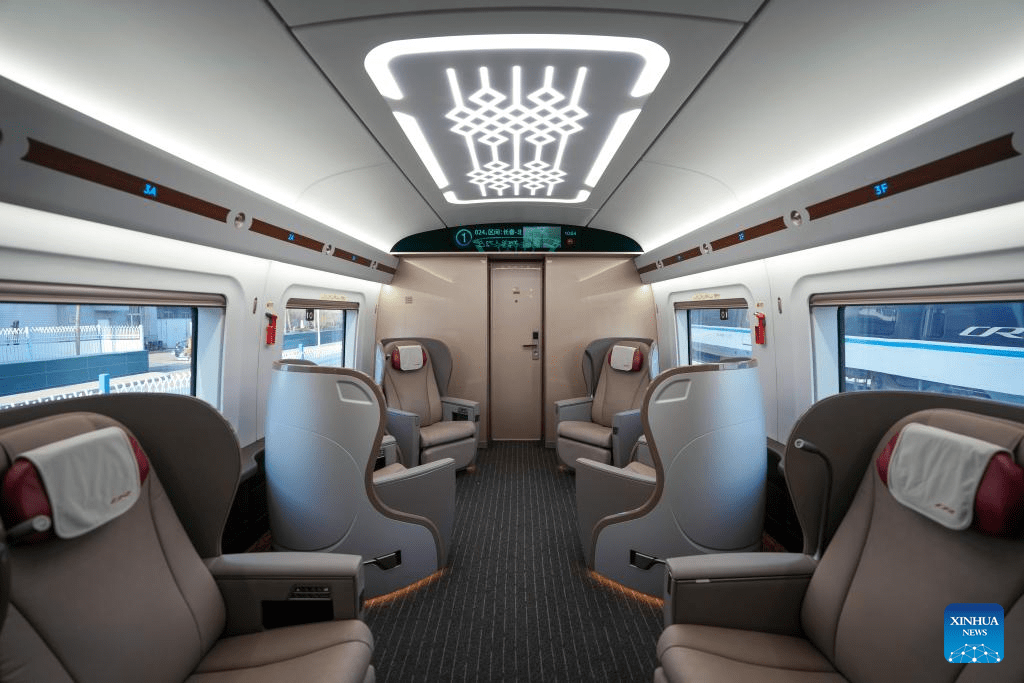Yesterday, China unveiled the prototypes of the CR450 high-speed train in Beijing, destined to redefine the standards of rail transport. With a test speed of up to 450 kilometers per hour and an expected operating speed of 400 kilometers per hour, the CR450 represents a significant technological advancement and an important contribution to the global rail industry.
This new train significantly exceeds the performance of the current CR400 Fuxing high-speed trains, which operate at a speed of 350 kilometers per hour. China State Railway Group Co., Ltd. (China Railway) has planned a series of line tests for the prototypes, with the aim of to optimize technical indicators e ensure the entry into commercial service of the CR450 in the shortest possible time.
Compared to its predecessors, the CR450 features a 22 percent reduction in overall operational resistance and a 10 percent decrease in weight, China Railway said. The new prototypes, called CR450AF and CR450BF, consist of eight cars, with a configuration of four powered and four non-powered cars, as reported by CRRC Corporation Limited (CRRC), China’s leading train manufacturer.
The prototypes presented stand out for an advanced water-cooled permanent magnet traction system and a high-stability trolley systemwhich guarantee excellent performance and safety during operation. They are also equipped with a multi-level emergency braking system and more than 4,000 sensors for real-time monitoring of key systems, including the bodywork, high-voltage pantograph, train control system and fire detection systems. An “over-the-horizon” system has been implemented to improve recognition of emergency situations, according to CRRC.
The CR450 design introduces a new undercarriage fairing to minimize drag at high speeds, along with a low-drag streamlined front end, aerodynamic windshields and lightweight materials. The integration of advanced noise reduction techniques across different areas and frequencies allows the interior noise to be reduced by 2 decibels and the service space for passengers to be increased by 4% compared to previous models. These innovations, according to CRRC, are set to give new impetus to the global advancement of high-speed rail technology.
Since the launch of the Beijing-Tianjin intercity line in 2008, designed for speeds of 350 kilometers per hour, China has built the world’s largest and most advanced high-speed rail network.. Major projects such as the Guangzhou-Shenzhen-Hong Kong Express Rail Link have significantly improved regional connectivity and development. To date, the total length of operational high-speed rail tracks in China has reached about 47,000 kilometers, according to data from the National Railway Administration.
The expansion of the national high-speed rail network has played a crucial role in the country’s economic and social development, reducing travel times and promoting industrial development along rail routes. China’s high-speed trains, a successful example of independent innovation, are now considered a calling card of China and have been positively received globally.

The Jakarta-Bandung high-speed railway in Indonesia, for example, has carried 4 million passengers since it began commercial operations on October 17, 2023. Indonesian train drivers operate trains at speeds of 350 kilometers per hour, in the first overseas high-speed rail project to fully use Chinese industrial systems, technologies and components. The Belgrade-Novi Sad high-speed railway, another Chinese-built project, also celebrated its second anniversary in March, effectively improving local connectivity.
Initiated by the International Union of Railways (UIC) in 1992, the UIC World Congress on High-Speed Rail is held every two to three years. The 12th congress will be held in Beijing from July 8 to 11, 2025, and will be a powerful testament to China’s progress and contributions to the global high-speed rail industry. China has led the development of all 13 international system standards for high-speed rail established by UIC, as announced during the 17th Zhan Tianyou Railway Science and Technology Award ceremony in November.











